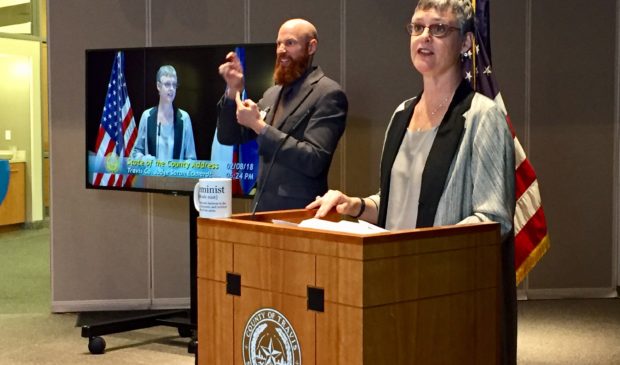Newsletter Signup
The Austin Monitor thanks its sponsors. Become one.
Most Popular Stories
- Austin opens new affordable housing development in Southeast Austin
- Congress Avenue transformation plan gets support from Urban Transportation Commission
- ZAP Commission forwards recommendation allowing some commercial uses in residential zones
- Ryan Alter and colleagues propose revision of boards and commissions
- Landmark commission says goodbye to Nau’s Enfield Drug
-
Discover News By District

In State of the County address, Eckhardt looks forward to future term
Friday, February 9, 2018 by Caleb Pritchard
With no credible threat to her re-election in November, Travis County Judge Sarah Eckhardt delivered a State of the County address on Thursday night that had the luxury of looking a full five years into the future.
Clocking in at just under 30 minutes, her tightly packed address raked across the broader yard of county issues, programs, priorities and partnerships. While she didn’t deliver a significant surprise akin to her revelation last year about headwinds facing a county-developed affordable housing project, Eckhardt did manage to drop several morsels of news involving transportation, criminal justice reform and a significant state grant aimed at easing pressure on the county jail.
But first, she told the gathered audience of approximately 100 people including Mayor Steve Adler, Sheriff Sally Hernandez, District Attorney Margaret Moore, County Tax Assessor-Collector Bruce Elfant, and commissioners Jeff Travillion and Brigid Shea, “Because of you the state of the county is strong.”
That vigor, Eckhardt suggested, is welcome news given the state of politics at the state level and above.
“The state has stopped governing, and since 2017, we can no longer rely on the federal government to fill that void,” she said.
Without hope for much assistance from those higher powers, the county is turning to its municipal partners, its neighboring counties, and the five other large urban counties in Texas. The latter partnership bore fruit in the response to Hurricane Harvey, an emergency during which Eckhardt said Travis County officials were in “constant communication” with their peers in Harris County.
One lingering piece of business the county itself must face is approaching a breakthrough, Eckhardt said. After touting last year’s deal with private developers to lease the downtown site that was the focus of a failed 2015 bond to build a new civil courthouse, Eckhardt teased, “In the coming weeks and months, we will roll out a process to build more courts at a location that is broadly embraced and at a total program cost significantly less than what we proposed in 2015.”
The county is also currently engaged in several efforts to relieve pressure on the county’s jail facilities, including the upcoming Sobering Center that will divert people picked up for intoxication from central booking. Meanwhile, Eckhardt said, the Jail Population Task Force continues to monitor inmates and search for other diversion solutions. One initiative to help people with mental health problems recently scored a $2.5 million grant from the state, Eckhardt announced.
The county could also begin exploring a major overhaul in the way it handles defendants’ constitutional right to an attorney. Currently, the county relies on the private sector to fill that role.
“Although Travis County has made considerable investments in appointed counsel for indigent defense, both in-house and independent studies are suggesting we seriously explore a comprehensive Public Defenders Office to reduce inequities in outcomes,” Eckhardt said.
In the meantime, the lengthy process to replace the Austin Police Department’s DNA lab, a forensics facility that shut down after an audit found egregious procedural violations, is coming to a head. The judge stressed her desire to see future DNA forensics handled outside of a law enforcement agency.
Looking east, Eckhardt said she “will put a laser focus” on economic development in communities in Precincts 1 and 4. A major component of that will include cooperation with the city and regional transportation partners to build new corridors and expand transit.
“This work will include tax benefit analysis of making Capital Metro’s Green Line a reality as a train or as a dedicated bus and autonomous vehicle corridor serving communities like Elgin, Manor and Colony Park along (U.S. Highway) 290 East.”
In Southeast Travis County, Eckhardt said she is working with City Council Member Delia Garza to develop a “regional food hub with local farms, small businesses, satisfying jobs, access to healthy food and significant economic stimulus.”
At the end of her speech, Eckhardt turned back toward the state and federal governments and complained of officials at both levels interfering with the county’s ability to raise revenue while also piling it with unfunded mandates. However, she also circled back to her hope that the partnerships among cities, counties and other community interests will rise to the challenge.
“Sharing power, sharing responsibility, sharing prosperity is the genius of a democratic nation. We have the courage to share in Travis County. Let’s show the region, the state and the nation how it’s done, y’all,” she concluded.
The Austin Monitor’s work is made possible by donations from the community. Though our reporting covers donors from time to time, we are careful to keep business and editorial efforts separate while maintaining transparency. A complete list of donors is available here, and our code of ethics is explained here.
You're a community leader
And we’re honored you look to us for serious, in-depth news. You know a strong community needs local and dedicated watchdog reporting. We’re here for you and that won’t change. Now will you take the powerful next step and support our nonprofit news organization?








